
Using the Hardy-Weinberg equation to calculate allele and genotype frequencies. Created by Sal Khan.
- Subject:
- Biology
- Life Science
- Material Type:
- Lesson
- Provider:
- Khan Academy
- Provider Set:
- Khan Academy
- Author:
- Sal Khan
- Date Added:
- 06/23/2014

Using the Hardy-Weinberg equation to calculate allele and genotype frequencies. Created by Sal Khan.

Biology is designed for multi-semester biology courses for science majors. It is grounded on an evolutionary basis and includes exciting features that highlight careers in the biological sciences and everyday applications of the concepts at hand. To meet the needs of today’s instructors and students, some content has been strategically condensed while maintaining the overall scope and coverage of traditional texts for this course. Instructors can customize the book, adapting it to the approach that works best in their classroom. Biology also includes an innovative art program that incorporates critical thinking and clicker questions to help students understand—and apply—key concepts.


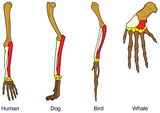
By the end of this section, you will be able to:Describe how the present-day theory of evolution was developedDefine adaptationExplain convergent and divergent evolutionDescribe homologous and vestigial structuresDiscuss misconceptions about the theory of evolution
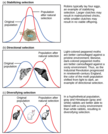
By the end of this section, you will be able to:Explain the different ways natural selection can shape populationsDescribe how these different forces can lead to different outcomes in terms of the population variation

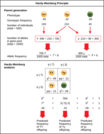
By the end of this section, you will be able to:Define population genetics and describe how population genetics is used in the study of the evolution of populationsDefine the Hardy-Weinberg principle and discuss its importance
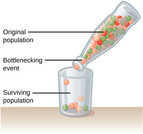
By the end of this section, you will be able to:Describe the different types of variation in a populationExplain why only heritable variation can be acted upon by natural selectionDescribe genetic drift and the bottleneck effectExplain how each evolutionary force can influence the allele frequencies of a population
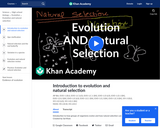
This 18-minute video lesson provides an introduction to evolution, variation in a population, and Natural Selection. [Biology playlist: Lesson 1 of 71].

This 13-minute video discusses how the Owl Butterfly may have gotten the spot on its wings. [Biology playlist: Lesson 5 of 71].
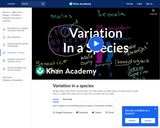
This 20-minute video lesson discusses how variation can be introduced into a species. [Biology playlist: Lesson 7 of 71].
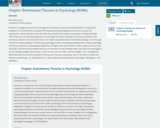
By David M. Buss, University of Texas at Austin. Evolution or change over time occurs through the processes of natural and sexual selection. In response to problems in our environment, we adapt both physically and psychologically to ensure our survival and reproduction. Sexual selection theory describes how evolution has shaped us to provide a mating advantage rather than just a survival advantage and occurs through two distinct pathways: intrasexual competition and intersexual selection. Gene selection theory, the modern explanation behind evolutionary biology, occurs through the desire for gene replication. Evolutionary psychology connects evolutionary principles with modern psychology and focuses primarily on psychological adaptations: changes in the way we think in order to improve our survival. Two major evolutionary psychological theories are described: Sexual strategies theory describes the psychology of human mating strategies and the ways in which women and men differ in those strategies. Error management theory describes the evolution of biases in the way we think about everything. Buss, D. M. (2021). Evolutionary theories in psychology. In R. Biswas-Diener & E. Diener (Eds), Noba textbook series: Psychology. Champaign, IL: DEF publishers.

An overview of what happens when the conditions for Hardy-Weinberg equilibrium are not fulfilled. Created by Sal Khan.

" We will cover fundamentals of ecology, considering Earth as an integrated dynamic system. Topics include coevolution of the biosphere, geosphere, atmosphere and oceans; photosynthesis and respiration; the hydrologic, carbon and nitrogen cycles. We will examine the flow of energy and materials through ecosystems; regulation of the distribution and abundance of organisms; structure and function of ecosystems, including evolution and natural selection; metabolic diversity; productivity; trophic dynamics; models of population growth, competition, mutualism and predation. This course is designated as Communication-Intensive; instruction and practice in oral and written communication provided. Biology is a recommended prerequisite."
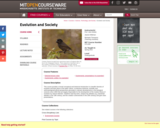
This course provides a broad conceptual and historical introduction to scientific theories of evolution and their place in the wider culture. It embraces historical, scientific and anthropological/cultural perspectives grounded in relevant developments in the biological sciences since 1800 that are largely responsible for the development of the modern theory of evolution by natural selection. Students read key texts, analyze key debates (e.g. Darwinian debates in the 19th century, and the creation controversies in the 20th century) and give class presentations.

An integrated course stressing the principles of biology. Life processes are examined primarily at the organismal and population levels. Intended for students majoring in biology or for non-majors who wish to take advanced biology courses.

This equation relates allele frequencies to genotype frequencies for populations in Hardy-Weinberg equilibrium. Created by Sal Khan.

Explore natural selection by controlling the environment and causing mutations in bunnies.

Psychology is designed to meet scope and sequence requirements for the single-semester introduction to psychology course. The book offers a comprehensive treatment of core concepts, grounded in both classic studies and current and emerging research. The text also includes coverage of the DSM-5 in examinations of psychological disorders. Psychology incorporates discussions that reflect the diversity within the discipline, as well as the diversity of cultures and communities across the globe.Senior Contributing AuthorsRose M. Spielman, Formerly of Quinnipiac UniversityContributing AuthorsKathryn Dumper, Bainbridge State CollegeWilliam Jenkins, Mercer UniversityArlene Lacombe, Saint Joseph's UniversityMarilyn Lovett, Livingstone CollegeMarion Perlmutter, University of Michigan